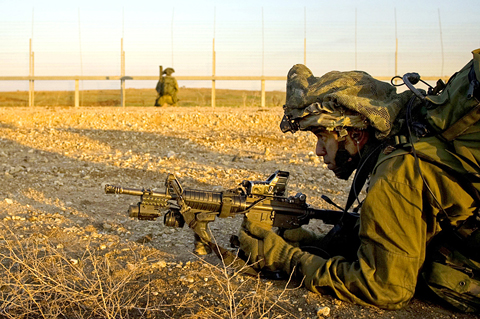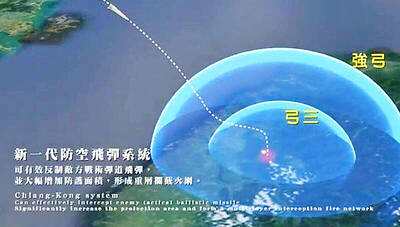Frantic families in Gaza fled advancing Israeli troops by car and on foot yesterday to the sound of booming explosions as infantry supported by tanks thrust farther into the Hamas-run enclave.
Streets remained deserted in Gaza City, capital of the battered and densely populated Palestinian territory, as it was encircled by Israeli forces cutting off the main access roads.
Stores were shuttered and long lines formed outside the few open bakeries, with those residents who decided to stay stocking up on goods for fear of a protracted conflict.

PHOTO: AP
The first night of Israel’s ground invasion of Gaza, which has been blasted with explosives from both air and sea, was sleepless for most of the city’s population as the sounds of war shattered the chilly night air.
Artillery shells rained down along the border, tanks firing in support of advancing infantry units in the northern Gaza Strip, and Hamas retaliated with mortar rounds and by setting off roadside bombs.
“My children are panicked because of the intensity of the bombardments that went on all the night,” Samir Haji, 46, said.
RUMBLING TANKS
The morning brought only more worry for many in Haji’s neighborhood south of Gaza City as tanks rumbled into the area accompanied by Israeli infantry.
Dozens of tanks and heavy bulldozers rolled into the area near the former Jewish settlement of Netzarim, with air support from Apache helicopter gunships.
“We are shaking like our children,” said Yehia Anis Hussein. “Even before this offensive, it was the blockade that was killing us. This is intolerable.”
Dozens of frantic families fled the area in cars. Some were also seen walking down roads, heading south and away from the advancing troops.
Israel poured ground troops into Gaza late on Saturday, upping a massive week-long bombing campaign of Hamas targets in the territory that the Islamists have run since June 2007.
Flames shot high into the night sky after Israeli warplanes bombed a gas depot near the northern town of Beit Lahiya, sparking a massive explosion.
A huge fire raged at the depot, on a main road through Gaza, which supplies cooking gas to the local population.
Flares streamed into the sky and exploded like fireworks, briefly casting light on the overcrowded territory.
As troops clashed with Hamas fighters on the ground, another battle raged on the airwaves, with Israel breaking into Hamas TV and radio broadcasts.
“Hamas leadership, your time is finished,” one message posted on al-Aqsa television said.
Earlier, the Islamist group’s radio service was interrupted by a male voice in Hebrew-accented Arabic: “Hamas leaders are hiding in the tunnels and are leaving you on the frontline of Israel’s defense forces.”
“Hamas leaders are lying to you and they are hiding in hospitals,” he said. “Launching rockets puts civilians in danger.”
UNITED NATIONS
Meanwhile, the UN Security Council failed to agree on a statement calling for an immediate ceasefire in the Gaza Strip after the US argued a return to the situation that existed before Israel’s ground invasion was unacceptable.
After nearly four hours of closed-door consultations late on Saturday, members of the council emerged without reaching agreement that would have asked Israel and Hamas to end eight-day hostilities that have claimed the lives of at least 460 Palestinians.
The meeting was the Security Council’s third since the conflict erupted on Dec. 27.
French Ambassador to the UN Jean-Maurice Ripert, who presides in the council this month, said “there was no formal agreement between member states” on a Gaza statement.
A draft statement submitted earlier for the council’s consideration by Libya on behalf of the Arab League had expressed “serious concern” about the ground invasion and called on the parties “to observe an immediate ceasefire and for its full respect.”
However, the document made no mention of the ongoing Hamas rocket attacks on Israeli territory that Israel said prompted its retaliatory offensive against Gaza, and the British and US ambassadors said the draft seemed too partial.
US deputy envoy Alejandro Wolff, talking to reporters after the consultations, said Washington believed it was important that the region “not return to the status quo” that had allowed Hamas to fire rockets into Israel.
“The efforts we are making internationally are designed to establish a sustainable, durable ceasefire that’s respected by all,” Wolff said.

LIMITS: While China increases military pressure on Taiwan and expands its use of cognitive warfare, it is unwilling to target tech supply chains, the report said US and Taiwan military officials have warned that the Chinese People’s Liberation Army (PLA) could implement a blockade within “a matter of hours” and need only “minimal conversion time” prior to an attack on Taiwan, a report released on Tuesday by the US Senate’s China Economic and Security Review Commission said. “While there is no indication that China is planning an imminent attack, the United States and its allies and partners can no longer assume that a Taiwan contingency is a distant possibility for which they would have ample time to prepare,” it said. The commission made the comments in its annual

DETERMINATION: Beijing’s actions toward Tokyo have drawn international attention, but would likely bolster regional coordination and defense networks, the report said Japanese Prime Minister Sanae Takaichi’s administration is likely to prioritize security reforms and deterrence in the face of recent “hybrid” threats from China, the National Security Bureau (NSB) said. The bureau made the assessment in a written report to the Legislative Yuan ahead of an oral report and questions-and-answers session at the legislature’s Foreign Affairs and National Defense Committee tomorrow. The key points of Japan’s security reforms would be to reinforce security cooperation with the US, including enhancing defense deployment in the first island chain, pushing forward the integrated command and operations of the Japan Self-Defense Forces and US Forces Japan, as

INTERCEPTION: The 30km test ceiling shows that the CSIST is capable of producing missiles that could stop inbound missiles as they re-enter the atmosphere Recent missile tests by the Chungshan Institute of Science and Technology (CSIST) show that Taiwan’s missiles are capable of intercepting ballistic missiles as they re-enter the atmosphere and pose a significant deterrent to Chinese missile threats, former Hsiung Feng III missile development project chief engineer Chang Cheng (張誠) said yesterday. The military-affiliated institute has been conducting missile tests, believed to be related to Project Chiang Kung (強弓) at Pingtung County’s Jiupeng Military Base, with many tests deviating from past practices of setting restriction zones at “unlimited” and instead clearly stating a 30.48km range, Chang said. “Unlimited” restrictions zones for missile tests is

PUBLIC SAFETY: The nationwide distribution campaign aims to enhance society’s overall understanding of threats and bolster defense awareness, an official said The latest edition of the National Public Safety Guide is being mailed to all citizens starting today to foster public awareness of self-defense in the event of war or natural disasters, the Ministry of National Defense said yesterday. “The guides will be disseminated to the public to enhance society’s overall understanding of threats and bolster defense awareness, demonstrating the government’s emphasis on people’s safety and its determination to pursue self-defense,” All-out Defense Mobilization Agency Director Shen Wei-chih (沈威志) said at the ministry’s news conference. The nationwide distribution campaign was planned according to President Lai William’s (賴清德) Sept. 20 directive, he said, adding